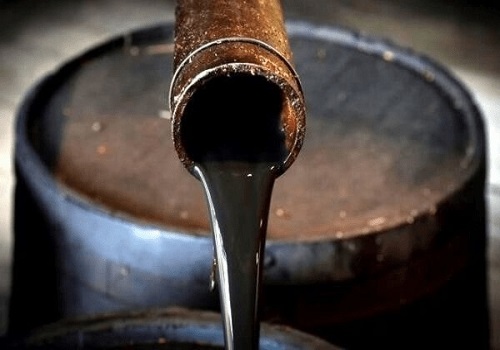Agri Picks Daily Technical Report 09 November 2021 - Geojit Financial

Follow us Now on Telegram ! Get daily 10 - 12 important updates on Business, Finance and Investment. Join our Telegram Channel
SPICES
* Jeera rose while turmeric and dhaniya ended down on NCDEX on Monday as trades resumed after extended weekend Diwali holidays. Jeera December futures rose to its highest level since August-end on rise in demand. Forecast of lower acreage too lend support. Zigzag moves were seen in Turmeric December futures and it ended marginally down for the day. However, expectation of firm export demand lend support limiting losses. Coriander December futures ended down. Absence of cues from the spot market weighed on.
* According to third advanced estimates by the farm department, spices output is seen rising to 10700000 tonnes in 2020-21, up by 5.5 per cent compared to 10140000 produced in 2019-20.
* The National Commodity and Derivatives Exchange Ltd has changed the delivery centre for coriander to Gondal in Gujarat from Kota in Rajasthan, the bourse said in a circular. Kota and Ramganj mandi in Rajasthan will be additional delivery centres for coriander. The modification would be applicable for contracts expiring in April and thereafter, with effect from Nov 1, it said.
* Jeera production is seen at 856,505 ton in FY 2020-21, down 6.1% on year according to the Spices Board.
* India exported 299,000 tn of jeera in 2020-21, up 40% on year according to the Spices Board.
* According to a survey conducted by the Federation of Indian Spice Stakeholders, jeera production in India is likely to be 478520 tons in 2020-21 (Oct-Sep), down by 11 per cent yoy.
* The Spices Board has pegged coriander production at 822,210 tn, up 17.3% on year.
* According to Spices Board, Coriander exports from India were up 21% on year at 57,000 ton.
* Government sees 2020-21 coriander output at 720000 tons compared to 701000 tons a year ago.
* Coriander production in Gujarat is expected to rise 55 per cent to 216680 tonnes in 2020-21 season (Jul-Jun) due to sharp rise in acreage according to the state’s farm department’s second advance estimates.
* The National Commodity Clearing Ltd has revised the lean period of turmeric to JanMar from the current Dec-Feb, the bourse said in a notification. The change will be effective from Tuesday.
* Spices Board sees exports of turmeric up 33% to 183000 tonnes in FY 2020-21 on yoy basis.

OILSEED
* All commodities in the oilseed complex settled in lower note on yesterday. Dec Soybean prices tracking weakness in CBOT soybean prices as harvest in US is progressing. CPO MCX Nov settled lower as government cut basic duties on edible oils to curb rise in prices. Dec NCDEX Refined Soy also down on cut in agri-cess and basic duty.
* The Centre cut basic duty on crude palm oil, crude soyabean oil and crude sunflower oil from 2.5% to nil The agri-cess on these oils has been brought down from 20% to 7.5% for crude palm oil and 5% for crude soyabean oil and crude sunflower oil, the Finance Ministry said. The basic duty on RBD Palmolein Oil, Refined Soyabean and Refined Sunflower Oil has been slashed to 17.5% from the current 32.5%
* Soymeal exports in September declined 83.3% on year to 15,000 tn, the Soybean Processors Association of India said in a release. For Oct-Sep, soymeal exports jumped to 1.9 mln tn from 862,000 tn a year ago. While soymeal production fell in September to 319,000 tn from 484,000 tn a year ago, it was at 7.7 mln tn during Oct-Sep, higher than 6.6 mln tn during the same period a year ago. Soybean arrivals in spot markets were lower at 275,000 tn in September compared to 400,000 tn the previous month. During Oct-Sep, arrivals rose to a little over 9.5 mln tn from 7.9 mln tn during the same period last year.By the end of September, mills, traders, and farmers were left with around 135,000 tn of soybean stock.
* Farmers in the country sowed the commodity across 4.5 mln ha as of Friday, up 36.4% on year, in the ongoing 2021-22 (JulJun) rabi season. The government fixed the minimum support price of the crop at 5,050 rupees per 100 kg for the 2022- 23 (Apr-Mar) marketing season, as against 4,650 rupees in the previous year.
* India's 2020-21 (Jul-Jun) mustard output is seen rising 22.6% on year to 8.95 mln tn, according to a joint survey by the Central Organisation for Oil Industry and Trade and the Mustard Oil Producers' Association.
* India's oilmeal exports fell nearly 36% on year to 183,625 tn in September, according to data released by The Solvent Extractors' Association of India. In Apr-Sep, overall exports of oilmeal were at 1.28 mln tn, down about 2% on year.
* The government reduced the effective import duty on CRUDE PALM OIL to 8.25% from 24.75%, and the effective import duty on REFINED SOYOIL to 19.25% from 35.75%
* The US Department of Agriculture in its October report lowered the oilseed output view by 2.4 mln tn to 497.4 mln tn in 2021-22 due to lower soybean, sunflower, and mustard output. Soybean output has been pegged lower for India, Argentina, and the European Union, it said. Also, sunflower production is seen lower for Ukraine and Russia due to the recent harvest results. However, the 2021-22 global ending stocks for soybean in October is pegged higher at 104.6 mln tn as against 98.9 mln tn estimated in the previous month. The rise in ending stocks for soybean is because of an increase in stocks in the US, Argentina, and China. The global soymeal production is pegged marginally lower at 258.1 mln tn in October versus 258.5 mln tn estimated in the previous month. Global soyoil production is pegged marginally lower at 61.7 mln tn for 2021-22 in the October report, while it was estimated at 61.9 mln tn for September.The demand for soyoil, and other edible oils, from major consumers such as India is expected to increase going ahead due to the onset of the festival season in the country.
* India's vegetable oil imports rose by 66% on year to nearly 1.8 mln tn in September, the Solvent Extractors' Association of India. During Nov-Sep, the country imported nearly 12.5 mln tn of vegetable oils, up nearly 1.7% from the year-ago period. Edible oil imports hit an all-time high of 1.7 mln tn in September against 1.0 mln tn a year ago, while for Nov-Sep, they increased marginally to 12.1 mln tn from 12.0 mln tn a year ago. As on Oct 1, India's ports had 845,000 tn of edible oil, and nearly 1.2 mln tn edible oil in the pipeline.
* The SEBI has asked the NCDEX not to launch new futures contracts of mustard seed till further notice.
* Brazil's soybean output for 2021-22 (Jan-Dec) is pegged at a record high of nearly 140.8 mln tn due to an increase in acreage under the oilseed, according to Conab.
* India's soybean acreage in the 2021-22 (Jul-Jun) kharif season remained unchanged at 12.2 mln ha, agri ministry.
* The base import tax on crude palm oil has been slashed to 2.5% from 10%, while the tax on crude soyoil and crude sunflower oil has been reduced to 2.5% from 7.5%, the government said in a notification late on Friday. The base import tax on refined grades of palm oil, soyoil and sunflower oil cut to 32.5% from 37.5%. After the cuts, crude palm oil, soyoil and sunflower oil imports will be subject to a 24.75% tax in total, including a 2.5% base import duty and other taxes, while refined grades of palm oil, soyoil and sunflower oil would carry a 35.75% tax in total.
* The government allowed the import of 1.2 mln tn of genetically-modified soymeal till Oct 31 to augment supply in domestic markets, the Directorate General of Foreign Trade said in a notification.
* The farm ministry in its fourth advance estimates cut the output estimate of soybean crop to 12.6 mln tn from 13.4 mln tn pegged in the third advance estimates.
* Crushing of mustard seeds by oil millers declined over 31% on year to 550,000 tn in July, data from Marudhar Trading Agency. Mills had crushed 800,000 tn of the oilseed during the same period last year, and in June this year, they crushed 600,000 tn of mustard. Low arrivals in physical markets hit crushing operations. Arrivals of the oilseed fell to almost 500,000 tn in July from 640,000 tn a year ago.
* India is likely to produce around 10 mln tn of mustard in 2020-21 (Jul-Jun), up 35% from a year ago, due to higher acreage and favourable weather conditions, according to the Solvent Extractors' Association of India.
* Malaysia's crude palm oil exports rose 37% on month to nearly 1.6 mln tn in September, data from the Malaysian Palm Oil Board. Exports from the country are likely to have risen because of firm demand from major consumers such as India ahead of the festival season. Total palm oil stocks in the country decreased nearly 7% on month to around 1.7 mln tn. Export of biodiesel fell 8% on month to 52,313 tn in September. Palm oil is used to make biofuel. Production of crude palm oil in September was largely unchanged on month at 1.7 mln tn.
* Malaysia's palm oil exports in October were estimated at 1.5 mln tn, down 13.4% on month, data from cargo surveyor SGS Malaysia.

COTTON
* The International Cotton Advisory Committee has raised its forecast for global prices for 2021-22 (Aug-Jul) due to expectation of lower global ending stocks and also because of a marginal rise in consumption. The committee revised its price forecast for Cotlook A Index, a global benchmark for prices of raw cotton, by 2 cents from the previous month to 104 cents per pound. In 2021-22 season, the committee has estimated global ending stocks for the season at 19.9 mln tn, compared with 20.2 mln tn in the previous season. Global consumption is projected at 26.0 mln tn, compared with 25.6 mln tn last year, due to likely rise in demand from India, Bangladesh and Vietnam. The agency sees global export for the season at 10.5 mln tn, as against 10.7 mln tn a year ago. Global production for the ongoing season is estimated at 25.7 mln tn, compared with 24.3 mln tn in the previous season. The rise has largely been attributed to higher production in the US. In the US, cotton production is estimated at 3.9 mln tn, against 3.2 mln tn a year ago. Production in India is expected to be 5.9 mln tn, compared with 6.0 mln tn in the previous year.
* The Cotton Association of India has estimated the output of the fibre in India for the 2021-22 (Oct-Sep) marketing season at 36.0 mln bales (1 bale = 170 kg), up 2% from its projection for the previous year. Exports for the ongoing marketing year is pegged at 4.8 mln bales, as against 7.8 mln bales a year ago. The Association has maintained its domestic cotton consumption at 33.5 mln bales. Ending stock for the season has been estimated at 6.2 mln bales, compared with 7.5 mln bales in 2020-21.
* The US Department of Agriculture's Foreign Agricultural Service has marginally scaled down its estimate for cotton output in India in 2021-22 (Aug-Jul) to 28.0 mln bales (1 US bale = 218 kg) from 28.3 mln bales projected a month ago.
* The US Department of Agriculture has scaled down its estimate for 2021-22 (Aug-Jul) cotton production in India to 28.0 mln bales (1 US bale = 218 kg , from 28.5 mln bales projected a month ago. The reduction in estimate is attributed to some crop loss because of excess rains during September end. Some damage to the quality was seen in the first round of picking due to rains, but the crop is likely to fare better and farmers may carry out three-four rounds of picking, said market participants. The agency has maintained its estimate for India's domestic consumption at 25.5 mln bales, while exports have been scaled down to 5.8 mln bales, as against 6.0 mln bales in the previous month. Ending stocks for the country are seen at 12.4 mln bales for 2021-22 season, compared with 13.8 mln bales a month ago. On global front, the agency has scaled up its global production estimate to 120.3 mln bales from 119.6 mln bales a month ago. The upward revision was mainly due to a likely bigger crop in Pakistan and Turkey, the agency said in its World Agricultural Supply and Demand Estimates report. Global cotton consumption is seen lower at 123.4 mln bales in 2021-22, versus 124.1 mln bales driven by a likely fall in consumption from China and Vietnam. China's consumption is reduced by 1 mln bales as the country is struggling with a severe shortage of electricity which has left millions of homes and businesses hit by power cuts. Global exports are estimated at 46.4 mln bales, lower than the earlier projection of 46.8 mln. The agency has raised its 2021-22 global ending stocks estimate to 87.1 mln bales from 86.7 mln bales.
* The new season for cotton which started on Oct 1, is expected to be good for farmers as the market price of the fibre is currently more than the minimum support price, due to firm demand and a rise in global prices.
* The UK-based Cotton Outlook has raised its estimate for global production in 2021-22 (Aug-Jul) by 219,000 tn to 25.98 mln tn, the agency said in its September report. The estimate has been revised upward as production in the US, China and Turkey is expected to be higher. The agency has raised its output estimate in the US to 4.03 mln tn from3.92 mln tn a month ago. Production in China is seen higher at 5.71 mln tn, compared with 5.64 mln tn in the previous month. The outlook for cotton production in India has been scaled down to 6.17 mln tn from 6.21 mln tn month ago. The agency also scaled up its estimate for global consumption in 2021-22 by 55,000 tn to 26.10mln tn owing to strong demand from Turkey. Global cotton ending stocks are estimated at 122,000 tn for the ongoing 2021-22 season. Sowing of cotton across the country has ended and farmers have sown the crop across 12 mln ha in the 2021-22 (Jul-Jun) kharif season, down 6% from a year ago, data from the farm ministry.
* India's cotton output in the 2021-22 (Oct-Sep) marketing year is seen at 36.2 mln bales (1 bale = 170 kg), as per the median of estimates of 13 prominent players in the cotton value chain polled by Informist.
* In the ongoing 2021-22 (Jul-Jun) season, cotton acreage across the country was 11.9 mln ha as on Thursday, down 5.8% from a year ago, data from the farm ministry showed.
* In the Union Budget for 2021-22 (Apr-Mar), Finance Minister Nirmala Sitharaman proposed customs duty of 5% on cotton and 10% on cotton waste. She also proposed an Agriculture Infrastructure and Development Cess of 5% on cotton, taking the overall customs duty to 10%. Customs duty on raw silk and silk yarn or yarn spun from silk waste has been increased to 15% from 10% earlier.

OTHERS
* Farmers in the country sowed rabi chana across 767,700 ha, down 17% on year, as of last Wednesday, data from the farm ministry showed. The fall in acreage is because many states are yet to commence sowing chana for the rabi season. Delayed rainfall this year has also hindered sowing of the crop. In Madhya Pradesh, the largest grower, chana acreage was 21,000 ha, down 67% on year, while in Rajasthan, the area under the commodity was 17% lower at 482,800 ha. However, in Karnataka, the area under the crop was at 218,000 ha, up 6% from a year ago.
* Stockists across the country had declared nearly 3.1 mln tn of pulses stock on the official portal of Department of Consumer Affairs as on Sep 20, the government said in a release today. The maintaining of data on stocks of essential commodities is expected to ensure smooth supply at affordable prices, according to the release.
* The Securities and Exchange Board of India has asked the National Commodity and Derivatives Exchange to not launch any new chana contracts on its platform till further notice, the market regulator said in a release on August 16. NCDEX has also been directed to not take any new positions for the running contracts, and only squaring up of positions will be allowed on the platform with immediate effect, according to the official release.
* Government raises MSP for Rabi crops for season 2022-23. MSP for chana has increased by 2.5 % to Rs. 5230/qtl. against Rs. 5100/qtl previous year.
* The clearing arm of the National Commodity and Derivatives Exchange Ltd, the National Commodity Clearing Ltd, said today that spread benefit in initial margin will be provided across futures contracts of guar seed and guar gum. The spread margin benefit for the guar gum and guar seed contracts will be 50% of the initial margin, the clearing corp said in a circular. In case of spread positions, additional margin shall not be levied, according to the circular. Additional margins are imposed on futures contracts in order to check price volatility.
* According to the Rajasthan State Agriculture department Kharif 2021-22 first estimate, guar production in the state is expected to be at 1373308 tonnes, a rise of 20.8 per cent compared to 1136888 tonnes a year ago.
* According to the Gujarat State Agriculture department Kharif 2021-22 first estimate, guar production in the state is expected to be at 106080 tonnes compared to 85930 tonnes a year ago.
* As of 02 September2021, the area under guar stood at 2113.20 thousand hectares compared to 2384.70 thousand hectares sown during the same period last year in the major growing state of Rajasthan, according to the data released by Rajasthan state agriculture department.
* According to Gujarat State farm department, area under guar stood at 111700 hectares as of September 13, 2021.
* As per a first information report on crop loss filed by the Kerala state farm department, so far, over 7,135 ha under paddy (mainfield), 6,026.9 ha under banana (bunched and non-bunched), 1,468.6 ha under rubber (tapped and untapped), 743.7 under vegetables (with and without pandal), and 496.5 ha under tapioca have been damaged due to landslides and flash floods.
* MCX Rubber November futures ended marginally up following a decline, while RSS4 grade rubber in the spot market steadied near Rs.179 a kg. Concerns over supplies continued lending support,

To Read Complete Report & Disclaimer Click Here
Please refer disclaimer at www.geojit.com
SEBI Registration number is INH200000345
Views express by all participants are for information & academic purpose only. Kindly read disclaimer before referring below views. Click Here For Disclaimer












 320-x-100_uti_gold.jpg" alt="Advertisement">
320-x-100_uti_gold.jpg" alt="Advertisement">












